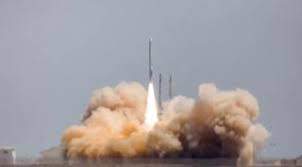China's iSpace fails to reach orbit in 2nd launch attempt

The first private Chinese company to reach orbit met with failure Monday (Feb. 1) during its second attempt to go to space.
iSpace's four-stage Hyperbola-1 rocket failed after liftoff while attempting to carry the cubesat-sized Fangzhou-2 (Ark-2) satellite into space, which also never made it.
Media reports indicate the launch attempt happened around 4:15 p.m. local time (3:15 a.m. EST; 0815 GMT) from the Jiuquan Satellite Launch Center in the Gobi Desert, which covers north and northeastern China.
"The rocket flew abnormally and the launch mission failed. The specific reasons are being further analyzed and investigated," Chinese state media source Xinhua said in a short media report about the failure, which Space.com machine-translated using Google from Chinese to English.
Pictures from social media appeared to show problems with the rocket, NASASpaceflight.com said in a report.
"Available images from the launch show the vehicle in trouble after leaving the launch complex," the news site wrote. "Around the time of MaxQ [maximum air pressure upon the rocket during flight], smoke is [seen] coming from the frontal part of the launcher that disintegrated a few seconds later, with debris raining on the desert landscape around the launch site."
China's iSpace, also known as Beijing Interstellar Glory Space Technology Ltd. (a fully different company than the Japanese lunar startup ispace) became the first Chinese private firm to reach orbit on July 25, 2019. The first launch also used a Hyperbola-1 rocket, carrying an amateur radio satellite, a technology verification payload for China Central Television, and three small payloads on the upper stage into space.
"Images of the first and second Hyperbola-1 rockets suggest significant changes in design between the two launches," SpaceNews said in a media report. The rocket includes three solid stages and a fourth stage with liquid propellant fuel.
iSpace is a prominent name in the Chinese private space industry, having raised $173 million in Series B funding for the Hyperbola rocket line. It also was planning on an IPO as of Jan. 12, SpaceNews added, as the company creates another rocket called Hyberbola-2 that may enter flight testing later this year.
China's government allowed launches and small satellites to open to private capital in 2014, leading to several commercial space companies coming to the fore — usually led by former employees of the state-owned and military entities that form most of China's launch activity, the media report from SpaceNews said. Chinese companies planning launches later this year include Galactic Energy, OneSpace, and Deep Blue Aerospace, with Landspace also getting ready for an eventual first flight.
Photo: The Chinese startup iSpace launched its Hyperbola-1 rocket for the first time in 2019. The second launch attempt on Feb.1, 2021 failed to reach orbit.(Image: © iSpace)
Link: https://www.space.com/chinese-startup-ispace-rocket-launch-failure?utm_source=Selligent&utm_medium=email&utm_campaign=SDC_Newsletter&utm_content=SDC_Newsletter+&utm_term=6260724




